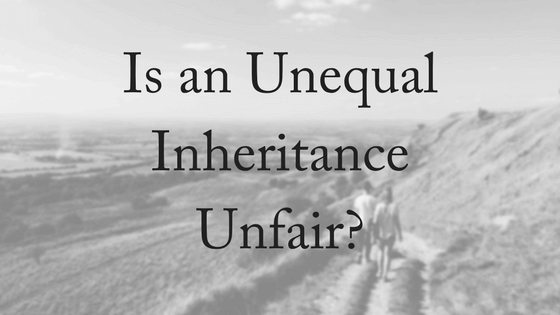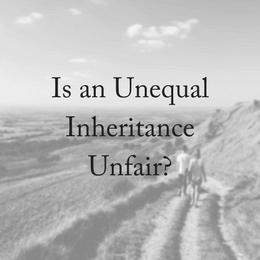
Is leaving your children an uneven inheritance fair?
Treating your children differently in your will usually spells trouble. Although distributing an uneven inheritance is not usually recommended, there are times when it might be the wiser course of action. This is because equality does not always mean equity is achieved.
In the United States, the number of parents who treat their children unequally in wills more than doubled from 1995 to 2010, according to an October 2015 working paper from the National Bureau of Economic Research. This research shows that almost 35 percent of parents plan to give their children an uneven inheritance. These uneven inheritance splits are are more likely to be found among people who are widowed or have divorced and it’s more common among adults born after 1960.
[Tweet “Research shows that Almost 35 percent of parents plan to give their children unequal bequests.”]
Western society expects equal rights and rally at the injustice of being treated any differently to someone else – especially if it means getting a smaller piece of the pie. In the United Kingdom, 44 percent of will dispute cases have siblings warring over their inheritance according to a 2014 survey by UK law firm Seddons. Claimants cite uneven inheritance in 32 percent of cases, and another 46 percent said it was because “they did not get what they were promised” or “someone took everything that was promised to them.” Although equal splits are generally the norm, when parents decide to write a will that seems to favour one child over another, chaos can erupt if there is little understanding as to why there was an unequal split. But does unequal mean unfair?
When Uneven Inheritance Is Being Fair
Bryan Mitchell, Accredited Specialist in Succession Law (Qld), says, “When you think about how parents treat children, they don’t treat each child equally. They try to treat them fairly and equitably.” But, “unequal can be hard and challenging,” she said. “It has to be thoughtful.” Although there are parents that don’t really think about, or don’t care about, the consequences of having an ‘unfair’ will where one child is treated with more inheritance cheer than another, many parents choose an unequal inheritance for practical reasons.
 Bryan Mitchell says it’s not unusual to see imbalances when parents are planning to provide for a special-needs child, for example, or passing on a family business when the kids have varying levels of interest and involvement. Other times, parents want to equalize gifts they have already made, he said — such as paying for one child’s education through medical school when another decided to complete a trade. Or where funds have been offered to buy a house, get married or start a business.
Bryan Mitchell says it’s not unusual to see imbalances when parents are planning to provide for a special-needs child, for example, or passing on a family business when the kids have varying levels of interest and involvement. Other times, parents want to equalize gifts they have already made, he said — such as paying for one child’s education through medical school when another decided to complete a trade. Or where funds have been offered to buy a house, get married or start a business.

A child has mental illness. Depending on the particular mental illness of the child, it may affect their ability to manage money wisely. It might be that you set up a trust so that they have a trustee who can responsibly manage the trust assets in a way that best benefits your mentally ill child.
A child doesn’t deal well with money. This could look different depending on the particular person. It may be that they constantly overspend and are in debt or close to bankruptcy because they have bad spending habits. It might be that you have a child who would not cope very well with a lump sum. Creating a trust to give the child a monthly amount, rather than a lump sum may help with both of these issues in helping them to stay on track.
A child is in the midst of difficult and precarious financial situation. Wills can be revised at any time while you are of sound mind. If your child is likely to get divorced soon or they are in the middle of a lawsuit, then an estate lawyer can help advise you on ways in which you might protect that child’s share of your estate.
A child has already received significant help financially. You may have helped one child with a house deposit or to pay for a university degree, so in your will you ‘balance out’ what another sibling gets. While one child didn’t get significant financial help from you while you were alive, all children end up being treated in the same manner in terms of the total amount given.
Communication is Essential
Communicating to your children why you have chosen to bequest your estate in the way you have is really important in reducing potential conflict and challenges. Bryan Mitchell says, “We strongly advise you let your children know what you’ve decided so they don’t blame each other for your decisions when you’re gone.” Communicating in person and with your whole family is a good idea, as well as including a letter of wishes with your will to help explain your decisions.
[Tweet “Communication can reduce family conflict when you choose to give your inheritance unequally.”]
At Estate Battles we can help you to explore what might work best for you and your children in your estate planning. Our experienced estate lawyers offer a free, 10-minute phone consultation. Please contact us today!

